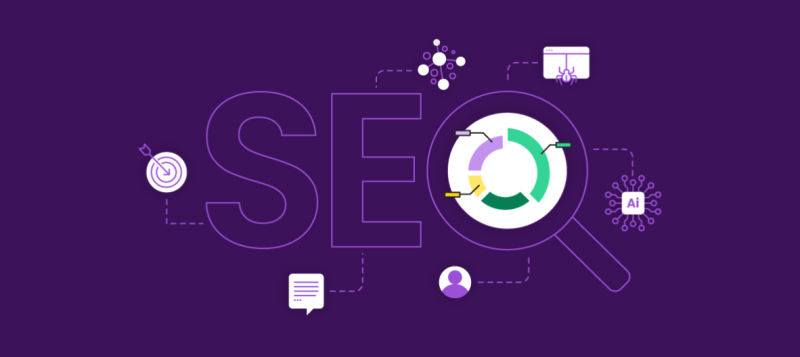As search engines continue to evolve, staying ahead of SEO trends is crucial for maintaining online visibility and competitiveness. In 2025, AI-driven algorithms, user experience, and high-quality content will play an even bigger role in search rankings. Traditional tactics may no longer be enough, and adapting to the latest changes will be essential for success. In this article, we’ll explore the key SEO trends you should consider in 2025 to optimize your website, improve search performance, and stay ahead of the competition.
The Impact of Google Algorithms on the Future of Search Engine Optimization
As we look ahead to 2025, it’s clear that Google’s search algorithms will continue to play a pivotal role in shaping the future of search engine optimization (SEO). The algorithms, which are designed to refine how Google interprets, ranks, and displays web pages, are evolving at an unprecedented rate. SEO professionals and digital marketers must remain agile and stay informed of the latest updates and trends to ensure their strategies remain effective.
Google updates, such as the introduction of BERT, RankBrain, and the upcoming algorithms on the horizon, continue to redefine the ways websites are evaluated. These search algorithms focus on enhancing user experience, better understanding search intent, and rewarding content that provides valuable, trustworthy information. As we move toward 2025, SEO professionals must adapt their strategies to incorporate the evolving nature of Google’s search algorithms.

The digital landscape is constantly evolving, and at the heart of this transformation are Google updates and search algorithms. These mechanisms dictate how websites are ranked, discovered, and interacted with online. As we move into 2025, the influence of Google’s ever-changing algorithms on search engine optimization (SEO) is more profound than ever. Businesses, marketers, and content creators must adapt to these shifts to stay competitive. The interplay between technology, user behavior, and Google’s priorities is shaping SEO trends that will define the future.
Google’s algorithms have become smarter, prioritizing user intent, content relevance, and technical performance over traditional optimization tricks. With SEO trends 2025 on the horizon, understanding how these algorithms evolve is critical. From AI-driven insights to mobile-first indexing, the future of SEO hinges on aligning with Google’s vision of a seamless, user-focused web. This article explores the key elements driving this evolution, offering actionable insights into the latest SEO trends and techniques that will dominate in the coming years.
Key Factors That Will Determine SEO in 2025
Several factors will shape SEO trends and techniques in 2025, driven by advancements in search algorithms and changing user expectations. First, the integration of artificial intelligence (AI) into Google’s systems is revolutionizing how content is evaluated. AI can now assess context, semantics, and even user satisfaction more effectively than ever before. This shift means that analyzing SEO performance trends will require a deeper understanding of machine learning models.
Second, user experience (UX) metrics, such as page loading speed and mobile-friendliness, are becoming non-negotiable ranking signals. Google’s Core Web Vitals, introduced years ago, continue to evolve, making technical SEO a priority. Third, the rise of personalized and local searches is pushing local SEO trends to the forefront, as Google tailors results based on user location and preferences. Finally, the quality of content—its depth, relevance, and trustworthiness—remains a cornerstone of Google SEO trends. Marketers must leverage tools like Google Trends for SEO to identify SEO keyword trends and align their strategies with current SEO trends.
By focusing on these factors, businesses can anticipate new trends in SEO and prepare for a landscape where adaptability and foresight are key. The interplay of technology and user behavior will continue to drive future SEO trends, making it essential to stay ahead of the curve.
In 2025, SEO will be influenced by several key factors. Understanding these factors will be critical for businesses and websites striving to maintain or improve their search rankings. Here are some of the main aspects that will shape the future of SEO:
- AI and Machine Learning – With AI’s role in analyzing user behavior, predicting search patterns, and enhancing content recommendations, SEO strategies will increasingly lean on automation and intelligence-driven optimizations.
- Content Quality – Google’s commitment to prioritizing content that provides expertise, experience, authority, and trust (E-E-A-T) will continue to dominate.
- Mobile-First Indexing – As mobile searches continue to rise, ensuring websites are optimized for mobile use will be a priority.
- Voice Search – With voice search growing in popularity, SEO tactics will need to adjust for conversational keywords and question-based queries.
- SEO Trends 2025 – The need to stay updated on the latest SEO trends will be essential, and businesses that fail to adapt could be left behind.
The analysis of SEO performance trends and staying on top of these factors will be necessary for success.
AI and Machine Learning in SEO
Artificial Intelligence (AI) and machine learning are already revolutionizing SEO, and their impact is only expected to grow in the coming years. These technologies help to streamline SEO tasks, from content creation to keyword optimization, making it easier for businesses to rank higher on Google.
Artificial intelligence and machine learning are no longer futuristic concepts—they are actively reshaping SEO marketing trends. Google’s reliance on AI, particularly through systems like RankBrain and BERT, allows it to understand natural language and user intent with unprecedented accuracy. This evolution in search algorithms is forcing SEO professionals to rethink their strategies, moving beyond keyword stuffing to creating content that genuinely answers user queries.
AI isn’t just a tool for Google; it’s becoming a game-changer for SEO practitioners. By harnessing AI, marketers can analyze vast datasets, predict SEO trends 2025, and optimize campaigns with precision. The integration of machine learning into SEO tools is one of the latest trends in SEO, enabling real-time adjustments to strategies based on performance data.
Using AI to Automate SEO Processes
AI can automate various aspects of SEO, from keyword research to content creation. For example, tools that use machine learning can analyze Google Trends SEO data, track changes in search algorithms, and predict upcoming trends in SEO. By using AI-driven tools, SEO professionals can make more informed decisions, resulting in optimized content that meets Google’s evolving ranking criteria.
AI tools also help in analyzing SEO performance trends by providing insights into how specific keywords are performing, helping to refine strategies and adapt to new SEO trends. With the advancement of AI, tasks like creating meta descriptions, optimizing internal linking, and identifying on-page SEO issues will become more automated, allowing marketers to focus on more strategic areas.

Voice Search and Its Growing Importance
Voice search has become a major factor in how users interact with search engines. As smart speakers, smartphones, and voice assistants like Siri, Alexa, and Google Assistant become more ubiquitous, the importance of voice search will only increase.
Why Are More and More People Using Voice Search?
The convenience of voice search, combined with the rapid advancements in natural language processing (NLP) technologies, has made it a preferred choice for users. People are using voice search to ask questions, find directions, shop online, and even control smart home devices. The speed and hands-free nature of voice search make it an increasingly popular option, especially for users on the go.
The rise of voice search is tied to convenience and accessibility. People are increasingly using devices like Amazon Echo, Google Home, and Siri to perform searches while multitasking—whether cooking, driving, or exercising. According to Google Trends for SEO, queries like “near me” and conversational phrases are surging, reflecting local SEO trends and a preference for instant results.
Younger generations, in particular, are driving this shift, with voice search aligning with their tech-savvy, mobile-first habits. The natural, intuitive nature of speaking rather than typing is fueling new trends in SEO, making it a priority for businesses to adapt or risk falling behind in SEO trends 2025.
How to Adapt Content for Voice Queries
To adapt content for voice queries, businesses need to focus on conversational, question-based keywords. Phrases like “what is,” “how to,” or “best way to” are commonly used in voice search. Marketers will need to create content that answers these types of queries succinctly and naturally, ensuring that their content is more likely to be featured in voice search results.
Adapting to voice search requires a rethink of content structure. Unlike traditional text searches, voice queries are longer, more conversational, and often phrased as questions. To rank for these, focus on current SEO trends like long-tail keywords and natural language. For instance, instead of targeting “best coffee shops,” optimize for “What are the best coffee shops near me?”
Content should also be concise and direct, as voice assistants prioritize quick answers. Using structured data (schema markup) enhances visibility in voice search results, aligning with latest SEO trends. By analyzing Google Trends SEO data, marketers can pinpoint popular voice queries and tailor their content accordingly, ensuring they stay competitive in this growing space.
By using Google Trends for SEO and regularly monitoring SEO keyword trends, businesses can better understand what questions and phrases are being searched, making it easier to craft content that matches the intent behind voice searches.
Content Quality is the Main Ranking Factor
With Google’s emphasis on delivering high-quality, relevant, and trustworthy content, content quality will remain one of the most significant ranking factors in 2025. While technical SEO and AI are critical, content quality remains the linchpin of search algorithms. Google’s focus on delivering valuable, user-centric content has intensified, making it the top ranking factor in 2025. The days of thin, keyword-stuffed pages are long gone—today’s SEO trends and techniques demand depth, originality, and relevance.
Why E-E-A-T (Expertise, Experience, Authority, Trust) is Becoming Even More Important
E-E-A-T (Expertise, Experience, Authority, and Trust) is a concept that Google uses to evaluate content quality. Websites that demonstrate expertise in a particular field, offer valuable insights, and build authority through backlinks and trust signals are more likely to rank highly. In 2025, Google will likely place even more importance on these factors, making it essential for websites to focus on producing authoritative and well-researched content.
Google’s E-E-A-T framework—Expertise, Experience, Authority, and Trust—is a cornerstone of its quality guidelines, especially for YMYL (Your Money or Your Life) topics like health and finance. In 2025, E-E-A-T is more critical than ever as Google updates prioritize credible sources. Websites must demonstrate real-world expertise and firsthand experience to rank well, reflecting future SEO trends.
Building authority through expert authors, reputable citations, and transparent information enhances trust signals. For ecommerce SEO trends, showcasing customer reviews and secure payment systems bolsters trustworthiness. Marketers should use Google Trends for SEO to identify topics where E-E-A-T can shine, ensuring content aligns with user expectations and Google’s standards.
How to Create Content That Meets Google’s New Standards
To meet Google’s new standards for content, SEO professionals should focus on creating long-form, comprehensive content that addresses the user’s intent. This includes answering questions clearly, citing reputable sources, and ensuring that the content is updated regularly to stay relevant. Additionally, creating content that aligns with SEO trends and techniques, and following the latest SEO trends, will help businesses stay competitive.
Page loading speed is a pivotal factor in Google SEO trends, directly impacting user experience and rankings. In 2025, with users expecting near-instant access to information, slow sites will be penalized more harshly. Google’s Core Web Vitals—metrics like Largest Contentful Paint (LCP) and Cumulative Layout Shift (CLS)—are now integral to search algorithms, making speed optimization a top priority.
A fast-loading site not only improves rankings but also reduces bounce rates, aligning with current SEO trends. Tools like Google PageSpeed Insights can help identify bottlenecks, while techniques like image compression, lazy loading, and CDN usage can enhance performance. As SEO trends 2025 evolve, speed will remain a competitive edge.
How Loading Speed Affects Rankings in 2025
Page loading speed is already a significant ranking factor, but as mobile usage increases and Google’s Core Web Vitals continue to influence rankings, page speed will be even more important in 2025. Websites that load quickly provide a better user experience, which is why Google places emphasis on it. Slow-loading websites will be penalized, leading to lower rankings and potentially higher bounce rates.
Mobile-First Indexing and Its Impact on SEO
With the majority of online searches now happening on mobile devices, Google has shifted to mobile-first indexing. This means that Google’s search algorithms prioritize the mobile version of a website over the desktop version.
Why Is the Mobile Version of the Site More Important Than the Desktop Version?
Mobile-first indexing ensures that mobile users have a seamless experience when visiting websites. In 2025, SEO will need to focus on mobile optimization, ensuring that websites are fully responsive, load quickly, and are easy to navigate on smaller screens. Sites that are not optimized for mobile will likely see a drop in rankings.
Local SEO and Search Personalization
As Google continues to refine its algorithms to offer users more personalized search results, local SEO will play a significant role in the future of SEO.
In 2025, businesses will need to optimize for local search results, especially as more people rely on their mobile devices for finding businesses nearby. Google My Business (GMB) profiles, localized keywords, and customer reviews will continue to be vital for local SEO success. Personalized search results based on user location, search history, and preferences will make it even more essential for businesses to leverage local SEO trends.
Local SEO is surging as search algorithms personalize results based on location. Small businesses and retailers must optimize for local SEO trends by claiming Google My Business profiles, earning local citations, and targeting geo-specific keywords. Personalization extends beyond location, with Google tailoring results to user history and preferences, a key aspect of future SEO trends. Staying visible requires a blend of local relevance and broad appeal.

How to Create Content That Gets into Google Quick Answers
Google Quick Answers, also known as featured snippets, offer concise answers to user queries directly at the top of search results. To optimize content for Google Quick Answers, SEO professionals should focus on crafting content that directly answers questions with clear and concise information. Including question-based keywords, using bullet points, and formatting content properly will improve the chances of being selected for featured snippets.
Changes in Link Building and Backlinks
Link building has been a crucial aspect of SEO for years, but in 2025, the approach to link building will continue to evolve.
Alternative Backlink Strategies in 2025
Traditional backlink strategies, such as guest posting or directory submissions, may lose effectiveness as search algorithms become better at detecting manipulative practices. In 2025, SEO professionals will need to focus on acquiring high-quality backlinks from authoritative sources, such as industry leaders, media outlets, and educational institutions. Creating content that naturally attracts backlinks, like data-driven research and in-depth guides, will become essential.
Beyond traditional outreach, consider alternative backlink strategies like digital PR, resource pages, and broken link building. These align with SEO trends 2025 by prioritizing relevance and user value. Analyze competitors’ backlinks using tools to uncover opportunities, ensuring your strategy reflects latest trends in SEO.
What Tactics Should You Implement Now?
As we head into 2025, SEO trends will continue to evolve, and businesses will need to adapt quickly to maintain their rankings. Some of the key tactics to implement now include:
- Staying up to date with Google updates and adjusting strategies accordingly.
- Analyzing SEO performance trends and making data-driven decisions to refine strategies.
- Focusing on mobile-first indexing by ensuring your website is mobile-friendly.
- Creating high-quality, authoritative content that aligns with Google’s standards for E-E-A-T.
- Optimizing for voice search by adapting content for natural, conversational queries.
By embracing these tactics, businesses can stay ahead of the curve and ensure they are ready for the SEO trends 2025.
To thrive in 2025, act now. Embrace AI for automation, optimize for voice and mobile, prioritize E-E-A-T in content, and refine technical SEO. Use Google Trends for SEO to track SEO trends and techniques, and adapt to future SEO trends proactively. The digital race is on—start today to secure your place at the top.
Together We Rise: A Campaign for Everyone